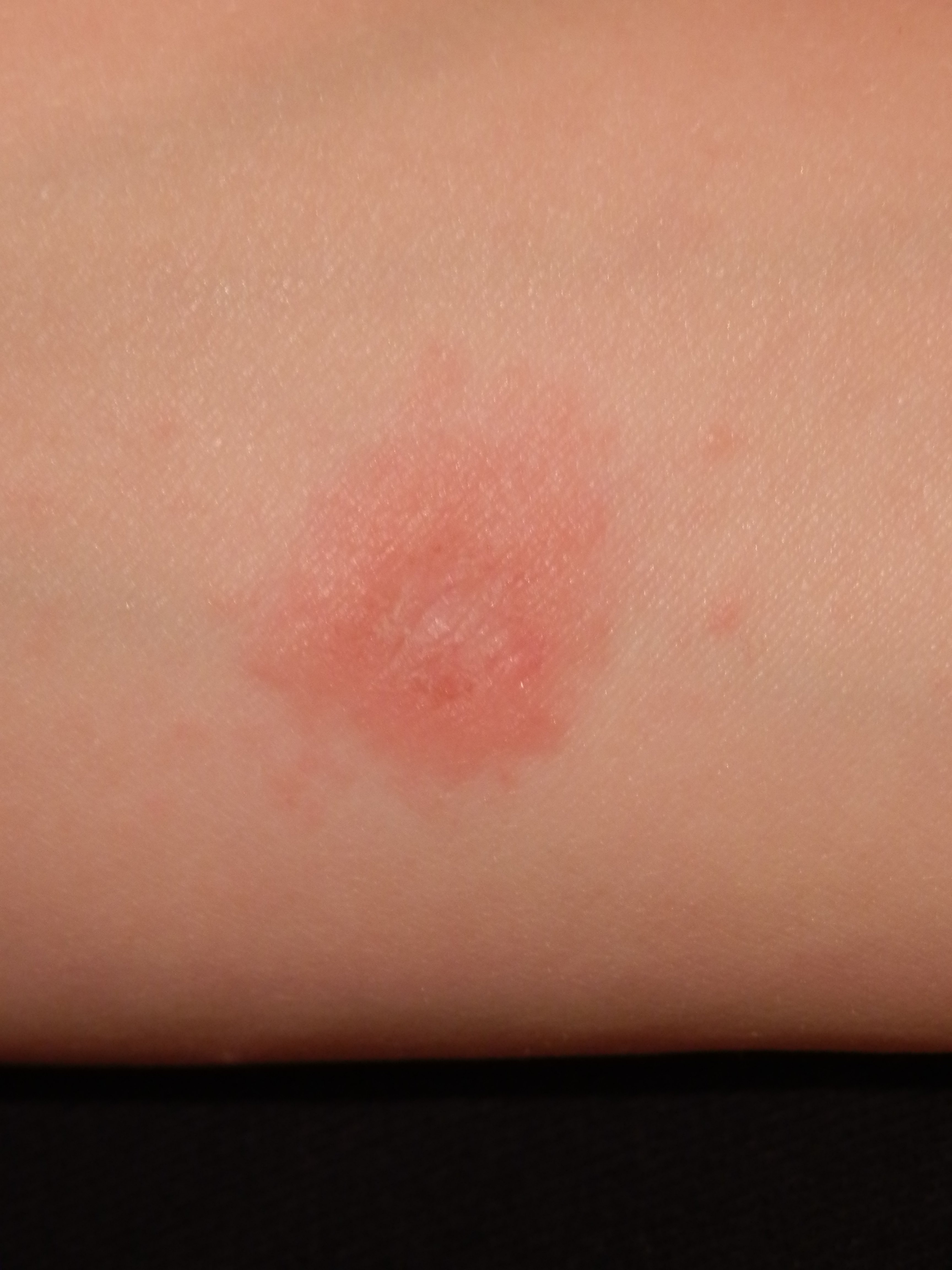Red bumps on the skin that itch can be an irritating and perplexing issue for many individuals. These bumps can appear anywhere on the body and range from mild irritations to severe conditions requiring medical attention. Understanding the root causes and potential treatments for these itchy red bumps is crucial for maintaining healthy skin and overall well-being.
The occurrence of red bumps on skin that itch can be attributed to various factors, including allergies, infections, or even stress. While some cases may resolve on their own, others might necessitate professional intervention. It's essential to recognize the symptoms early and seek appropriate care to prevent complications or worsening of the condition.
In this comprehensive guide, we'll delve into the common causes, symptoms, and treatments of red bumps on skin that itch. By the end of this article, you'll have a clearer understanding of how to identify and address these pesky skin issues, ensuring you can tackle them effectively and maintain optimal skin health.
Read also:Lancome Cosmetics An Indepth Look At Luxurious Beauty Products
Table of Contents
- What Causes Red Bumps on Skin That Itch?
- Allergies and Their Role
- Could It Be an Infection?
- How Does Stress Affect Your Skin?
- Identifying Symptoms of Itchy Red Bumps
- How Are Red Bumps Diagnosed?
- Effective Treatments for Itchy Red Bumps
- Preventing Red Bumps on Skin That Itch
- Home Remedies: Do They Work?
- When Should You See a Doctor?
- Red Bumps in Children: Special Considerations
- Managing Itchy Skin in the Elderly
- Debunking Myths About Itchy Red Bumps
- Lifestyle Changes to Avoid Itchy Skin
- Frequently Asked Questions
- Conclusion
What Causes Red Bumps on Skin That Itch?
Red bumps on the skin that itch can arise from numerous causes, each with distinct characteristics and implications for treatment. Understanding these causes is vital for proper diagnosis and management. Below are some common reasons why these itchy red bumps might occur:
- Allergic reactions to food, medication, or environmental factors.
- Infections caused by bacteria, viruses, or fungi.
- Skin conditions like eczema or psoriasis.
- Insect bites, including mosquitoes and bedbugs.
- Stress-induced flare-ups.
Each of these causes requires a unique approach to treatment and care, making it essential to identify the underlying issue accurately.
Allergies and Their Role
Allergies are a prevalent cause of red bumps on the skin that itch. When the body identifies a substance as harmful, it reacts by releasing histamines, leading to symptoms like itching and redness. Common allergens include:
- Pollen
- Pet dander
- Certain foods like nuts and shellfish
- Medications
- Cosmetics
Managing allergies involves identifying triggers and avoiding them, alongside using antihistamines to relieve symptoms.
Could It Be an Infection?
Infections are another potential cause of red, itchy bumps on the skin. These can be bacterial, viral, or fungal in nature, each presenting differently:
- Bacterial: Impetigo is a common bacterial infection causing red sores. It requires antibiotics for treatment.
- Viral: Chickenpox and shingles are viral infections that manifest as itchy red bumps.
- Fungal: Ringworm causes a ring-shaped rash, often itchy and red.
Treatment typically involves antimicrobial medications, with the specific type depending on the infection.
Read also:Visual Guide To Identifying Skin Cancer Cancerous Skin Tags Pictures
How Does Stress Affect Your Skin?
Stress is a significant factor that can exacerbate skin conditions, leading to itchy red bumps. It triggers the body to produce cortisol, which can increase oil production in the skin, resulting in acne and other skin issues. Stress-reduction techniques include:
- Regular exercise
- Mindfulness and meditation
- Healthy sleep habits
- Balanced diet
By managing stress effectively, you can mitigate its impact on your skin.
Identifying Symptoms of Itchy Red Bumps
The symptoms of itchy red bumps vary depending on the underlying cause. However, common symptoms include:
- Redness and swelling
- Itching or burning sensation
- Blisters or pus-filled lesions
- Scaly or dry patches
Recognizing these symptoms early can help in seeking timely medical intervention.
How Are Red Bumps Diagnosed?
Diagnosing red bumps on the skin involves a thorough examination by a healthcare professional. This process may include:
- Physical examination of the affected area
- Patient history to identify potential triggers
- Allergy tests to detect specific allergens
- Skin biopsy for further investigation
Accurate diagnosis is crucial for effective treatment planning.
Effective Treatments for Itchy Red Bumps
Treatment options for red bumps on the skin that itch vary based on the cause. Common treatments include:
- Topical creams: Steroid creams can reduce inflammation and itching.
- Oral medications: Antihistamines or antibiotics may be prescribed.
- Home remedies: Oatmeal baths and cool compresses can provide relief.
- Lifestyle changes: Reducing stress and avoiding allergens can prevent flare-ups.
Consulting a dermatologist can help tailor a treatment plan specific to your needs.
Preventing Red Bumps on Skin That Itch
Prevention strategies are essential to minimize the occurrence of itchy red bumps. Consider the following tips:
- Identify and avoid known allergens.
- Maintain a healthy skin care routine.
- Keep skin moisturized to prevent dryness.
- Wear protective clothing to avoid insect bites.
- Manage stress through relaxation techniques.
By implementing these strategies, you can reduce the risk of developing red bumps on your skin.
Home Remedies: Do They Work?
Home remedies can be effective in managing mild cases of red bumps on the skin that itch. Popular remedies include:
- Oatmeal baths: Soothing and anti-inflammatory.
- Aloe vera gel: Hydrates and soothes irritated skin.
- Coconut oil: Moisturizes and reduces inflammation.
While these remedies offer relief, they are not a substitute for professional medical treatment when needed.
When Should You See a Doctor?
It's vital to seek medical attention if:
- The red bumps persist for more than a week.
- There is severe pain or discomfort.
- You experience other symptoms like fever or chills.
- The condition interferes with daily activities.
A healthcare provider can offer a more accurate diagnosis and appropriate treatment options.
Red Bumps in Children: Special Considerations
Children are particularly susceptible to skin issues like itchy red bumps due to their sensitive skin. Common causes include:
- Chickenpox
- Hand, foot, and mouth disease
- Allergic reactions
Parents should monitor symptoms closely and consult a pediatrician for persistent or severe cases.
Managing Itchy Skin in the Elderly
The elderly may experience red bumps on the skin that itch due to various factors, including:
- Thinner skin, making them more susceptible to irritation
- Chronic conditions like diabetes or kidney disease
- Medications that may cause skin reactions
Special care and attention are necessary to manage these conditions effectively in older adults.
Debunking Myths About Itchy Red Bumps
Several myths surround the issue of itchy red bumps on the skin, such as:
- All itchy bumps are contagious.
- Scratching will help relieve the itch.
- Home remedies can cure all types of skin bumps.
It's essential to separate fact from fiction to ensure proper treatment and care.
Lifestyle Changes to Avoid Itchy Skin
Adopting a healthy lifestyle can significantly impact skin health and prevent itchy red bumps. Consider these changes:
- Eat a balanced diet rich in vitamins and minerals.
- Stay hydrated to maintain skin moisture.
- Exercise regularly to improve blood circulation.
- Avoid smoking and excessive alcohol consumption.
These lifestyle adjustments can promote healthier skin and reduce the risk of irritation.
Frequently Asked Questions
1. Can stress cause red bumps on skin that itch?
Yes, stress can lead to skin issues like itchy red bumps by triggering an increase in cortisol levels, which affects skin health.
2. Are red bumps on the skin always a sign of an allergy?
No, while allergies are a common cause, infections and other skin conditions can also result in red, itchy bumps.
3. Is it safe to use home remedies for red bumps on skin?
Home remedies can be effective for mild cases, but it's important to consult a healthcare provider for persistent or severe symptoms.
4. How can I prevent red bumps on my skin?
Preventive measures include avoiding known allergens, maintaining a healthy skincare routine, and reducing stress.
5. Should I see a doctor for red bumps that itch?
If the bumps persist, cause significant discomfort, or are accompanied by other symptoms, medical consultation is recommended.
6. Can children get red bumps on their skin that itch?
Yes, children are prone to skin issues like red, itchy bumps due to various causes, and parental supervision is essential.
Conclusion
Red bumps on skin that itch can be a frustrating experience, but understanding their causes, symptoms, and treatments can empower you to manage and prevent them effectively. Whether caused by allergies, infections, or stress, addressing these factors with the appropriate care and lifestyle adjustments can lead to healthier skin and improved quality of life. Always consult a healthcare professional for persistent or concerning symptoms to ensure optimal treatment and care.

